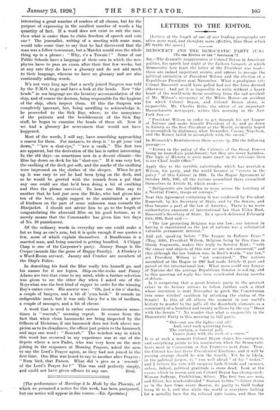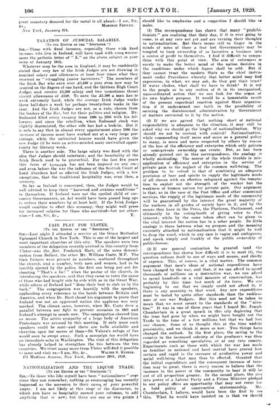LETTERS TO THE EDITOR.
[Letters of the length of one of our leading paragraphs are often more read, and therefore more effective, than those which
fill treble the space.] ---
DEMOCRACY AND THE DEMOCRATIC PARTY (U.S.). [To THE EDITOR or THE " SPECTATOR.") SLR.—The dramatic reappearance of Colonel Bryan in American polities, his speech lust night at the Jackson banquet, at which Democratic love feast the letter of the President was read— these are indeed important events, and appear to presage the Political extinction of President Wilson and the election of a Republican President next November. What a prodigious vote Colonel Roosevelt would have polled had not the fates decreed otherwise! And yet it is impossible to write without a heavy heart of the world-wide fiasco resulting from the sad accident of Mr. Wilson's occupancy of the White House—an accident for which Colonel Bryan, and Colonel Bryan alone, is responsible. Mr. Charles Betts, the editor of an important Massachusetts newspaper, writes this morning in the New York Sun :-
"President Wilson in order to get through his pet League of Nations and make himself President of it, and go down in history as the first President of the World, evidently hoped to accomplish by diplomacy what Alexander, Caesar, Napoleon, and the Kaiser failed to accomplish with the sword."
In Bismarck's Reminiscences there occurs (p. 235) the following passage :—
" Errors in the policy of the Cabinets of the Great Powers bring no immediate punishment; but they are never harmless. The logic of History is even more exact in its revisions than is our Chief Audit Office."
Apply this to the terrible catastrophe which has overtaken Wilson, his party, and the world because of "errors in the Policy " of this Cabinet in 1914. In the Hague Agreement of October 18th, 1907, all the nations assembled there committed themselves to Article 11, which reads :— " Belligerents are forbidden to move across the territory of a Neutral Power, troops or convoys."
Next this Agreement containing 11 was confirmed by President Roosevelt, by his Secretary of State, and by the Senate, and thus became a part of the law of America. There is no more authoritative exponent of international law than Elihu Root, Roosevelt's Secretary of State. In a speech delivered February 15th, 1916, Root said :— " The law protecting Belgium was our law; our interest in having it maintained as the law of nations was a substantial valuable permanent interest."
And yet, speaking before " The League to Enforce Peace" (May, 1916), President Wilson; Belgium being by this time in bloody fragments, makes this reply to Senator Rook: "with the causes and objects of this war we are not concerned," and this although the law broken was, in Root's words, "our law," yet President Wilson is " not concerned." The nations assembled at the Hague in 1907 had made Article 11 part and parcel of the international law. What more could any League of Nations do? the average Republican Senator is asking, and to this question no reply has been vouchsafed during months of debate.
Is it surprising that a great historic party in the greatest crisis in its history refuses to follow further such a chief whose intention is next November to pitch the Constitution into some witches' cauldron by attacking the status of the Senate? Is this of all others the moment in our world's history to muster to the polls all the disorderly elements in a community of a hundred and twenty millions by the cry " Down with the Senate"? No wonder that what is responsible in the Democratic Party is this morning in full panic.
" Out—out are the lights—out all!
And, over each quivering form, The curtain, a funeral pall, Comes down with the rush of a storm."
It is at such a moment Colonel Bryan stages his emergence. and everything points to his nomination when the Democratic hosts meet in Convention at San Francisco next June. True, the Colonel has lost three Presidential Elections, and it will be Passing strange should he win the fourth. Yet ho is likely, in the political jargon, to " run well ahead " of his " ticket," and I believe his vote will surprise both friends and enemies. unless, indeed, political gratitude is stone dead. Look at the causes which in season and out Colonel Bryan has championed: Woman Suffrage, Prohibition, Silver. The first two are won, and Silver, his much-ridiculed " Sixteen to One "—Silver stares us in the face from every Bourse, its parity to Gold to-day being 15 to 1, and this while the world is everyhere looking for a metallic base for its colossal note issues, and thus the great monetary demand for the metal is all.altead.—I am, Sir,



































 Previous page
Previous page